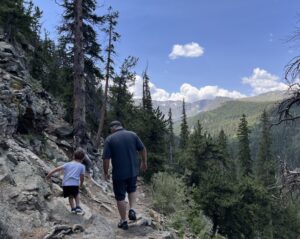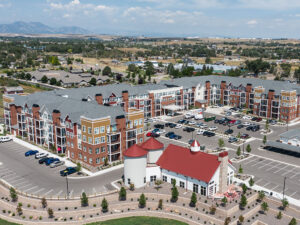The Importance of Being Prepared for Winter Driving in Colorado
Relocating to Denver means adjusting to the city’s high altitude and the severe winter weather that can sweep through the region. While Denver itself may not always receive the heaviest snowfall, the surrounding mountains and unpredictable nature of Colorado’s winter storms require drivers to be well-prepared. Newcomers should adopt a proactive approach to winter driving by ensuring their vehicles are equipped and ready for any weather event.
Equip Your Vehicle for Winter Conditions
One of the first steps when preparing for winter driving in Colorado is to ensure your vehicle is equipped for the conditions. Whether moving to Denver or another part of Colorado, a winter-ready car will provide peace of mind.
Tires: Proper tires are essential. Snow tires or high-quality all-season tires with good tread are crucial. While all-wheel drive or four-wheel drive helps, tires are the most critical factor in maintaining control on icy or snow-covered roads. Newcomers should note that tire requirements vary by region; high-altitude areas often require snow tires, even in suburban neighborhoods.
Windshield Wipers and Fluid: Replacing windshield wipers before winter begins is vital. Snow, sleet, and freezing rain can quickly obscure visibility, so functioning wipers and ample windshield fluid are essential for safe driving.
Battery Maintenance: Cold temperatures can significantly reduce battery performance. It’s essential for everyone, especially those unfamiliar with Colorado’s winter conditions, to have their car batteries tested to avoid breakdowns.
Emergency Kit: Every vehicle should carry an emergency kit, especially for those relocating to Denver or planning mountain trips. Essential items include blankets, non-perishable food, water, jumper cables, a flashlight, tire chains, and a first aid kit. These supplies could be life-saving during unexpected snowstorms or breakdowns.
Understanding Local Driving Laws and Requirements
When moving to Denver, familiarity with Colorado’s winter driving laws is crucial for newcomers. These regulations are designed to ensure road safety during severe weather.
Colorado’s Chain Law: During periods of heavy snow or ice, certain roads and mountain passes in Colorado may require vehicles to have chains. Newcomers should be aware that vehicles without chains may be turned back from certain mountain routes, particularly on roads leading to ski resorts. They should also make sure their car is equipped with tire chains if they’re planning on traveling through mountainous areas..
Snow Tires and Traction Laws: Colorado has specific laws about snow tires and traction devices. Vehicles must have snow tires or other forms of traction if the road signs indicate that traction is required. These laws typically apply to highways and mountain passes, which can experience rapidly changing weather conditions. Newcomers should keep in mind that these laws are enforced in many areas, so they should always check road conditions before heading out.
Winter Safety Checkpoints: For those relocating to Denver or moving to other parts of Colorado, it’s good to know that snowplows, salt trucks, and law enforcement may set up checkpoints to monitor weather conditions and road safety. Newcomers should be prepared for the possibility of road closures or delays due to snow and ice. These checkpoints are in place to help ensure that drivers are following winter safety regulations..
Essential Winter Driving Tips for Newcomers
For newcomers unfamiliar with winter driving in Colorado, adapting to local conditions is key to staying safe. Here are critical techniques to master:
Drive Slowly and Maintain Distance: One of the most important things for newcomers to remember when driving in winter conditions is to reduce their speed. Snow and ice can significantly reduce traction on the road, so it’s important to drive slowly and avoid quick movements. Newcomers should always maintain a safe distance from the vehicle in front of them. Keeping at least four seconds of following distance will help provide enough time to react if the vehicle in front stops suddenly.
Anticipate Icy Spots: Certain areas in Colorado are more prone to ice, particularly in the early mornings and late afternoons. Bridges, overpasses, and shaded areas are more likely to freeze, even if the rest of the road is clear. Newcomers should stay alert, and look for ice patches when driving, especially in higher altitudes or when the temperature is close to freezing.
Know When to Stay Off the Road: Winter storms in Colorado can be intense, and sometimes it’s best to stay off the road altogether. If a snowstorm is predicted, especially in mountainous regions, check the weather forecasts and road conditions before venturing out. Newcomers to the area should know that winter storms can cause treacherous driving conditions with little warning. Ifnewcomers don’t feel comfortable driving, it’s okay for them to delay their trip until conditions improve.
Brake Carefully: When driving on snow or ice, avoid slamming on the brakes. Instead, apply gentle, consistent pressure to slow down. If skidding occurs, steer gently into the skid to regain control. Newcomers should practice braking on snowy or icy roads to get a feel for how their vehicle responds in different conditions.
Know the Road Conditions Before Heading Out: Before traveling anywhere, particularly when moving to Denver, it’s important to stay updated on current road conditions. The Colorado Department of Transportation (CDOT) provides real-time updates on road status, closures, and weather hazards. Checking these reports before heading out ensures informed decisions.
Adapting to Denver’s Unique Winter Driving Conditions
For those relocating to Denver, there are some unique challenges to consider when it comes to winter driving. While Denver itself might not see the same amount of snow as the mountain regions, it can still experience rapid weather changes, especially in the fall and spring months. Snowstorms can come unexpectedly, and Denver’s location on the edge of the plains and the foothills means drivers can encounter a variety of weather conditions in one day.
Prepare for Changing Conditions: In Denver, it’s common to experience sunny, dry conditions one day, followed by a snowstorm the next. This means that it’s important to keep an eye on the weather forecast and be ready for sudden changes. A typical Denver winter day may begin with clear skies but end with snow and ice, so driving may become hazardous. Newcomers should be aware of this phenomenon, which is especially important when traveling to or from the mountains.
Navigating Mountain Roads: When you’re moving to Denver, one of the biggest adjustments will be navigating the mountain roads. Colorado’s mountainous regions often experience much harsher weather conditions than the cities. Even though it’s easy to get excited about visiting ski resorts or heading up into the mountains for winter sports, drivers should be cautious on these winding roads. The combination of snow, ice, and steep inclines can make for treacherous conditions.
Use Public Transportation When Possible: Denver has an extensive public transportation system that can be a lifesaver during winter months. If the weather looks bad or you don’t feel confident driving in snowy conditions, consider taking the bus or light rail instead of driving. Newcomers who may not be accustomed to mountain driving or icy conditions may find this a safer alternative.
Final Thoughts on Winter Driving in Colorado for Newcomers
Winter driving in Colorado can be challenging, but with the right knowledge, preparation, and mindset, it’s entirely manageable. Moving to Denver or any other part of Colorado means getting used to diverse weather patterns, mountainous terrain, and the potential for quickly changing conditions. Newcomers should ensure that their vehicle is properly equipped for winter, familiarize themselves with local driving laws, and always be ready for unexpected weather events. By following these tips and being mindful of the unique challenges of winter driving in Colorado, new residents can stay safe and confident on the road throughout the winter months.
Request your free Denver Relocation Guide here




